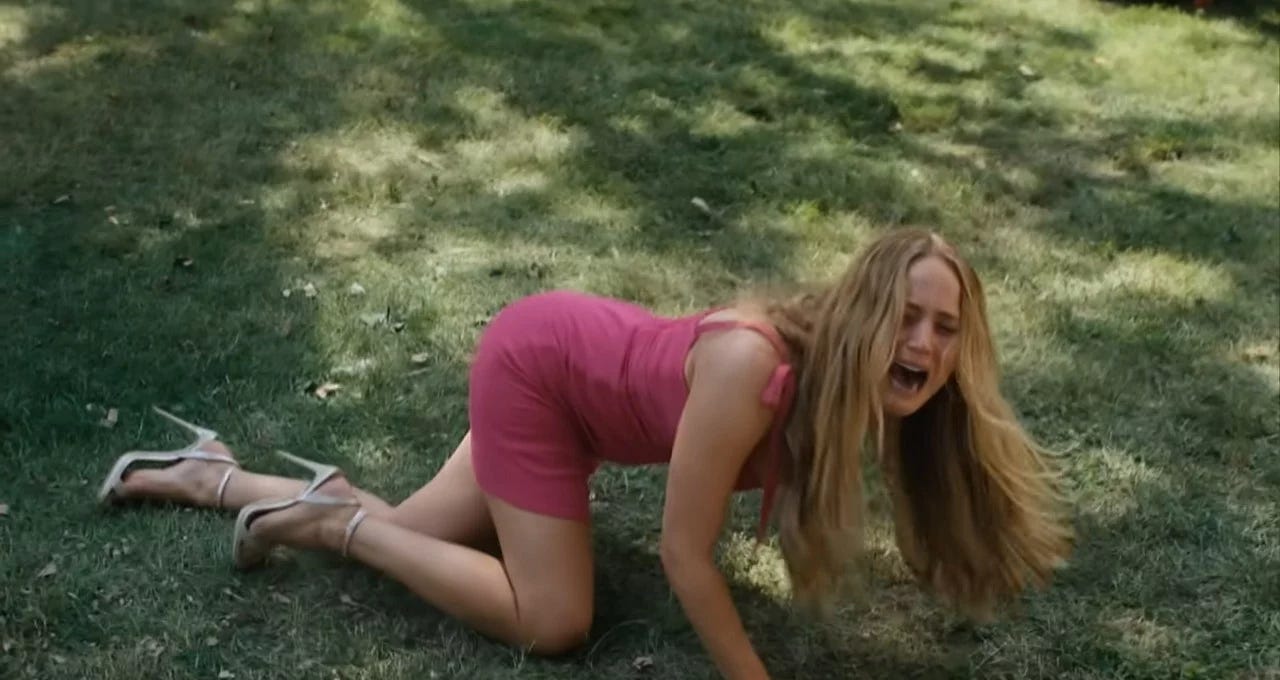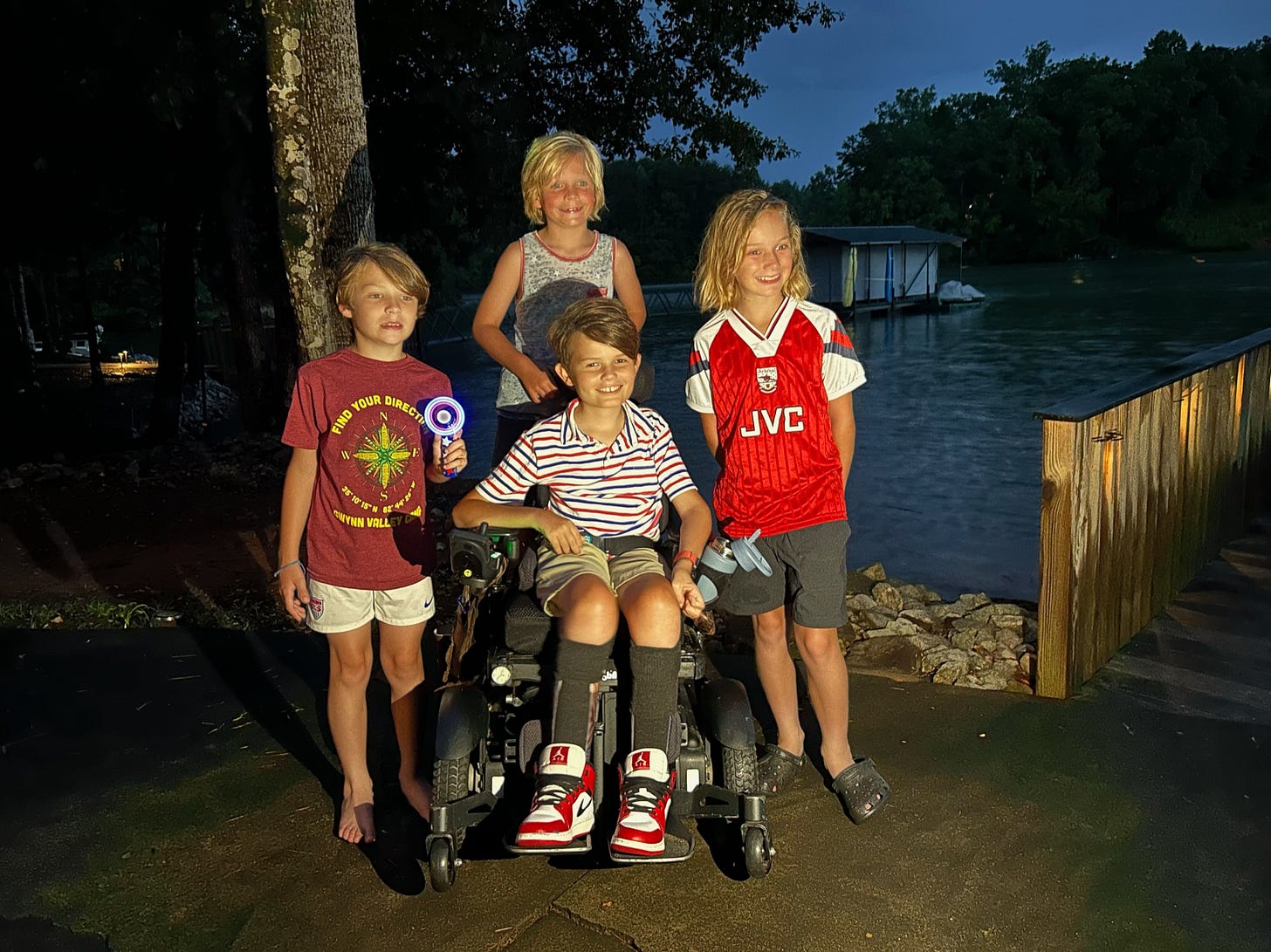Volume 4, Issue 76: Denial, Anger, Acceptance
"Insurance? There'll be an Italian president before I see any insurance money."
Hey, the book’s out. If you haven’t bought it yet, you should. If you have, you should write a (hopefully positive!) review of it on Goodreads or Amazon or both. I hope those of you who have a copy are enjoying it. Also, bookplates are finally (and slowly) rolling their way out to some of you over the next fortnight.
One of the more formidable movies of my teenage years—one of those movies that made me sit up and think differently about life, about movies, about art, about love—was Albert Brooks’ 1991 film Defending Your Life. I’m not sure Defending Your Life is the best Albert Brooks movie—that’s probably Lost In America—but it’s the warmest, the most accessible and the most emotional. And it features an all-time charmer of a Meryl Streep performance that proves she could have been Julia Roberts, if she had really wanted to.
Defending Your Life, if you haven’t seen it (and you should correct that right now), opens with middle-aged yuppie Daniel (Brooks) dying in a car accident. (He drops his CD cases on the floor of the passenger seat and crashes in to a bus while trying to pick them up, a very ‘90s way to die.) He wakes up in Judgment City, an afterlife waystation where the food is incredible and has no calories, where the weather is always 72 and perfect, where the top tourist attraction is the Past Lives Pavilion, a place you can learn who you were in previous incarnations. There, a defense attorney (played here perfectly by Rip Torn, in a preview of the role he’d play on “The Larry Sanders Show”) faces off with a prosecutor, arguing the case of your life, playing back clips of pivotal moments, moments when you were faced with difficult, life-changing decisions, to decide how you handled them. Specifically, Judgment City exists to answer one essential question: How did you handle fear? Did you overcome your fear? Or were you overwhelmed by it?
If the judges decide you overcame your fear on earth, you’re moved on to “the next phase.” If they decide you didn’t, they send you back to earth, as a different person, to try again. One of the movie’s many great jokes is that you can get a sense of what the judges think of the strength of your case by the lodgings you stay in in Judgment City: Streep’s Julia, who lived an altruistic and courageous life on earth, is in The Four Seasons; Daniel has a Motel 6 by the airport.
The movie is wonderful, funny, philosophical, endlessly charming and deeply romantic: It is the most feel-good movie someone like Brooks could possibly make. But, more than 30 years later, no longer watching it as a teenager but instead as a middle-aged man who is now actually older than Daniel is in the film, none of that is what stands out to me the most about the film today. What stands out the most is that central premise: Looking back on one’s life and judging it on how well one handled fear. Daniel and Julia (and everyone in Judgment City) are not judged by their good deeds, or their dedication to their families, or their views on social justice, or by some sort of moral scorecard. They are judged much more simply: Did they spend their lives afraid? Did they embrace the incredible gift that is life? Or did they shirk and cower from it? The movie attempts to answer that fundamental question: When you look back on your life, will you feel as if you lived it to the fullest? Will you wish you would have done more? Did you do all you could? Or were you too afraid?
The world of 2023 is a very different one than the world of 1991. There is much more to be afraid of today. Or maybe it just seems that way.
******************
I was having a conversation with my editor a few weeks back, right before the book came out, about our children and the world they are inheriting. (A fundamental theme of the book.) Specifically, we were discussing active shooter drills. His kids’ school has them, as does mine, as does, as this point, essentially every elementary school in the country. I understand why they do them, and I do not blame schools for having them: It is probably the responsible the thing to do.
I still sort of think it’s wrong. And the reason I think it might be wrong is that I believe the benefit it provides—students being prepared for the statistically-still-extremely-improbable scenario that someone will enter their classroom with a weapon—is outweighed by the profound side effect: The now-in-their-brain notion that someone might come through that door, that door they’re looking at all day, to try to shoot them. I will confess that I am personally skeptical that any amount of training, such as it is, can be truly utilized by a nine-year-old in the heat of a horrifying moment, but even if these classroom exercises do theoretically work in the event of a crisis, they are still highly, highly unlikely to ever be utilized. (There are more school shootings than should be tolerated by any sort of civilized society. Kids are still incredibly unlikely, like, less-than-being-struck-by-lightning unlikely, to be involved in one.) One thing that isn’t highly unlikely, though, is that these kids, as a result of these exercises and every other thing we’ve warned them could eventually be a threat, are being told that they must always be prepared and vigilant, on guard, reactive, defensive—scared. It is not just shooting drills, of course. It is everything. It is, in many ways, our own anxiety projected onto them: A sense that the world is falling apart, a sense that we cannot protect them, a sense that we must try to shelter them in all the small ways because we cannot shelter them in the big ones. We have begun to see the ramifications of an entire generation of kids, perhaps multiple generations, feeling this way every day of their lives, from infancy. It is the worst gift we could have possibly given them.
I do want my children to be safe; the central lesson of my life over the last 12 years is that it turns out I want this more than I want anything else in the world. But part of that safety—what I personally believe to be the most important part—is that they not walk around the world feeling as if a piano is about to fall on their heads. To live in constant fear is to live with increased anxiety, and dread, and, ultimately, fatalistic emptiness. To live in constant fear is not to live at all.
I want to be clear here: I do not know if I am right about this. (A surprisingly large percentage of parenting is having passionate beliefs about what is best for your children while also being aware that you know nothing and may well be completely full of shit.) You could be reading this and believe me helplessly naive, or at least willfully misguided, purposefully blind, even glib. There is, after all, a lot to be afraid of out there, not to mention that someone like me, who has not historically battled anxiety, is exercising his own privilege here: Don’t be afraid! is a much easier thing for me to say than it is for many others. I certainly do not mean to minimize that. The world we have given them is so damaged; it is their burden to repair what we have broken while there is still a world left to fix.
But I do think there is at least some intellectual benefit in trying to think of this, of minimizing fear the best we can, in an aspirational way. David Mamet, before things went haywire on him, had a great line in his underrated thriller The Spanish Prisoner: “Worry is interest paid in advance on a debt that never comes due.” Part of being human, part of living a vibrant life, is being fully aware of the perils that the world will throw at you but not being overcome by them: To, in fact, be fortified enough to face them, and move on despite of them. We cannot conquer our fears. But we must try not to let them destroy us. That is the life I want for my kids, and yours, and everyone’s, and for all of us: To live life as fully as we can, to be able to look back and say that we embraced this life, that we did not let it pass us by. This is perhaps the greatest victory we can hope for.
In many ways, Defending Your Life is pretty radical today, because it dares to argue that, in the end, if you get to look back at your life once it’s over, you’ll focus on the micro (your life) rather than the macro (the world outside of you that you cannot control). It argues, that, when it’s all over, you’ll see the opportunities you missed, personally, rather than the ones that may or may not have been taken from you by some external force. It argues the world is full of peril and disappointment and sadness, and that it always has been and always will be: It’s how you respond to all that that defines you.
“Fear is like a giant fog,” Rip Torn’s lawyer tells Daniel, when he explains why Judgment City values what it does. “It sits on your brain and blocks everything - real feelings, true happiness, real joy. [Humans often] can't get through that fog. But you lift it, and buddy, you're in for the ride of your life.”
Life is so, so hard. My kids, everyone’s kids, me, you, we all have to know that. But it’s my responsibility—and, eventually, my kids’—to face that hardness, accept it as a state of life and try to embrace every fleeting moment that they have on this earth, the best they can, while they can. The world is full of terrifying things, things with teeth, things that bite. But they’re not everywhere, and they’re not everything, and if they’re coming for you, you couldn’t stop them even if you wanted to, even if you knew they were coming. There’s a great world out there for these kids, and for all of us. I truly believe that. If you can lift it, buddy, you’re in for the ride of your life.
Here is a numerical breakdown of all the things I wrote this week, in order of what I believe to be their quality.
AI Tennis Announcers Were Inevitable, The Atlantic. Honestly, most broadcasters sound like robots anymore anyway.
Predictions for the 2028 All-Star Team, MLB.com. This is a fun thing to get wrong every year.
Every Harrison Ford Movie, Ranked and Updated, Vulture. Updated with Indiana Jones and the Dial of Destiny.
Your Home Run Derby Power Rankings, MLB.com. Two former Cardinals outfielders in this one.
PODCASTS
Grierson & Leitch, we discussed three movies I liked: “Indiana Jones and the Dial of Destiny,” “No Hard Feelings” and “Reality.”
Seeing Red, no show this week.
Waitin' Since Last Saturday, no show this week.
LONG STORY YOU SHOULD READ THIS MORNING … OF THE WEEK
“Phoebe Waller-Bridge’s Great ‘Indiana Jones’ Adventure,” David Marchese, The New York Times Magazine. As a “Fleabag” superfan, I loved reading about Waller-Bridge’s current creative journey. How do you remain interesting and engaged when writing a “Tomb Raider” series? Good question! I love this line: “I love the feeling of having done what’s been asked, but I hate the feeling of pleasing.”
ONGOING LETTER-WRITING PROJECT!
This is your reminder that if you write me a letter and put it in the mail, I will respond to it with a letter of my own, and send that letter right to you! It really happens! Hundreds of satisfied customers!
Write me at:
Will Leitch
P.O. Box 48
Athens GA 30603
CURRENTLY LISTENING TO
“With Or Without You,” U2. With all the U2-performing-at-the-rotating-Vegas-orb business, I thought it might be nice to get back to basics and remind everybody just how great of a band this truly was, at one point, and how they even sometimes still are. Also Bono still isn’t as good at singing “The Fly” as your humble narrator is.
Remember to listen to The Official Will Leitch Newsletter Spotify Playlist, featuring every song ever mentioned in this section.
Also, now there is an Official The Time Has Come Spotify Playlist.
I hope everyone had a grand Fourth. We were at Lake Keowee in South Carolina, as we are every year, grilling, waving flags, mocking the Trump boats.
Have a great weekend, everyone.
Best,
Will







Important thing to teach your boys.
enjoyed the movie a lot - thank you